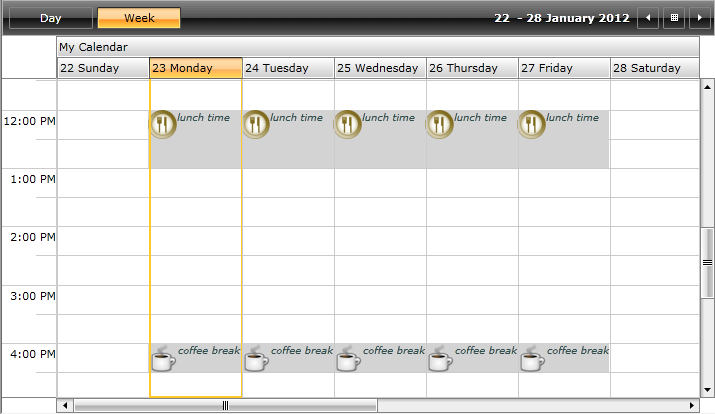Custom Slots
This article describes how you can create a custom SpecialSlot, add custom properties to it and bind the properties in the Slot template.
Please check here for more details about SpecialSlots.
Let's for example have the following RadScheduleView grouped by "Calendar" ResourceType:
<telerik:RadScheduleView AppointmentsSource="{Binding Appointments}">
<telerik:RadScheduleView.ViewDefinitions>
<telerik:WeekViewDefinition />
</telerik:RadScheduleView.ViewDefinitions>
<telerik:RadScheduleView.ResourceTypesSource>
<telerik:ResourceTypeCollection>
<telerik:ResourceType Name="Calendar">
<telerik:Resource ResourceName="My Calendar" />
<telerik:Resource ResourceName="Team Calendar" />
</telerik:ResourceType>
</telerik:ResourceTypeCollection>
</telerik:RadScheduleView.ResourceTypesSource>
<telerik:RadScheduleView.GroupDescriptionsSource>
<telerik:GroupDescriptionCollection>
<telerik:ResourceGroupDescription ResourceType="Calendar" />
<telerik:DateGroupDescription />
</telerik:GroupDescriptionCollection>
</telerik:RadScheduleView.GroupDescriptionsSource>
</telerik:RadScheduleView>
We will define a custom Slot class, create a collection of custom Slot objects which then will be set to the SpecialSlotsSource property.Also in this tutorial we will crete custom ScheduleViewStyleSelector class and define the needed Styles.
- First, create a class which inherits Telerik.Windows.Controls.ScheduleView.Slot class:
public class BreakSlot : Slot
{
public string ImageSource { get; set; }
public string Description { get; set; }
public BreakSlot(DateTime start, DateTime end) : base(start, end)
{
this.Resources.Add(new Resource("My Calendar", "Calendar"));
}
public override Slot Copy()
{
Slot slot = new BreakSlot(this.Start, this.End);
slot.CopyFrom(this);
return slot;
}
public override void CopyFrom(Slot other)
{
var otherSlot = other as BreakSlot;
if (otherSlot != null)
{
this.ImageSource = otherSlot.ImageSource;
this.Description = otherSlot.Description;
base.CopyFrom(otherSlot);
}
}
}
Note how Copy and CopyFrom methods in the custom slot class are overriden!
- Then you should create the collection of BreakSlot objects and set their additional properties:
this.SpecialSlots = new ObservableCollection<Slot>()
{
new BreakSlot( new DateTime(2012, 1, 23, 12, 0, 0), new DateTime(2012, 1, 23, 13, 0, 0)) {
RecurrencePattern = new RecurrencePattern(null, RecurrenceDays.WeekDays, RecurrenceFrequency.Weekly, 1, null, null),
ImageSource = "meal_icon.png",
Description = "lunch time"
},
new BreakSlot(new DateTime(2012, 1, 23, 16, 0, 0), new DateTime(2012, 1, 23, 16, 30, 0)) {
RecurrencePattern = new RecurrencePattern(null, RecurrenceDays.WeekDays, RecurrenceFrequency.Weekly, 1, null, null),
ImageSource = "coffee_icon.png",
Description = "coffee break"
}
};
- The next step is to create the ScheduleViewStyleSelector class:
public class SpecialSlotStyleSelector : ScheduleViewStyleSelector
{
private Style breakSlotStyle;
public Style BreakSlotStyle
{
get
{
return this.breakSlotStyle;
}
set
{
this.breakSlotStyle = value;
}
}
public override Style SelectStyle(object item, DependencyObject container, ViewDefinitionBase activeViewDefinition)
{
Slot slot = item as Slot;
if (item is BreakSlot)
return this.BreakSlotStyle;
return base.SelectStyle(item, container, activeViewDefinition);
}
}
- and to define the Style:
<local:SpecialSlotStyleSelector x:Key="SpecialSlotStyleSelector">
<local:SpecialSlotStyleSelector.BreakSlotStyle>
<Style TargetType="telerik:HighlightItem">
<Setter Property="Template">
<Setter.Value>
<ControlTemplate>
<Border Background="LightGray">
<StackPanel Orientation="Horizontal" VerticalAlignment="Top" HorizontalAlignment="Left">
<Image Source="{Binding Slot.ImageSource}" MaxHeight="29" />
<TextBlock Text="{Binding Slot.Description}" FontSize="10" FontStyle="Italic" Foreground="DarkSlateGray" />
</StackPanel>
</Border>
</ControlTemplate>
</Setter.Value>
</Setter>
</Style>
</local:SpecialSlotStyleSelector.BreakSlotStyle>
</local:SpecialSlotStyleSelector>
If you're using Implicit Styles please, notice that the Style that targets the HighlightItem should be based on the default HighlightItemStyle.
- Finally, bind them to SpecialSlotsSource and SpecialSlotsStyleSelector properties:
<telerik:RadScheduleView AppointmentsSource="{Binding Appointments}"
SpecialSlotsSource="{Binding SpecialSlots}"
SpecialSlotStyleSelector="{StaticResource SpecialSlotStyleSelector}">
<telerik:RadScheduleView.ViewDefinitions>
<telerik:WeekViewDefinition />
</telerik:RadScheduleView.ViewDefinitions>
...
</telerik:RadScheduleView>
Here is the result:
